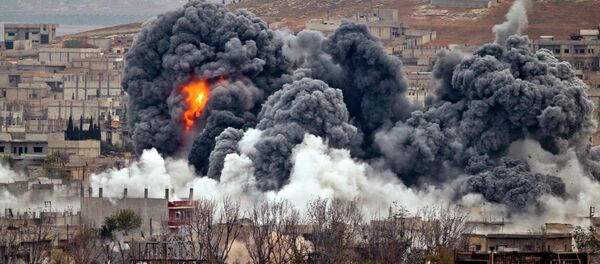Lord Richards said that Prime Minister David Cameron needed to put the country on a "war footing" and that the current strategy of training and arming local Iraqi government forces and Syrian rebel groups, combined with air raids, needed to be "revisited."
"Tanks would have to roll and there's going to have to be boots on the ground," he said in an interview with the BBC, while saying the existing approach was "dribbling" instead of "clouting" the jihadists.
"The current strategy won't work in the time I think we've got available. The current strategy is essentially one of equipping and training others to do the hard stuff for us. I think that could work but the scale of effort going into it is woefully insufficient.
"If we really want to get rid of them [ISIL]… we need to effectively get on a war footing."
No 10 on Lord Richards' Isil comments: "Suggestion of putting combat forces on the ground is not being considered" http://t.co/VlvsKBGNh7
— PoliticsHome (@politicshome) July 20, 2015
The former armed forces chief also raised concerns that the seemingly half-hearted approach to tackling ISIL was "simply firing up the problem rather than dealing with it."
UK Push to Bomb Syria
The comments comes as David Cameron today said that extremist ideology was the "struggle of our generation," in what is thought to be the clearest message that he may renew a push to officially join the air raid campaign of ISIL targets in Syria.
We need to confront and expose Islamist extremism as a belief system that glorifies violence & subjugates people. (1/3)
— David Cameron (@David_Cameron) July 20, 2015
Time and again, Britain has refused to compromise on our values or give up our way of life. And we shall do so again. (2/3)
— David Cameron (@David_Cameron) July 20, 2015
Together we can defeat extremism — and build a stronger, more cohesive society. Please share this message: https://t.co/pLRyJMeNx1 (3/3)
— David Cameron (@David_Cameron) July 20, 2015
The increased talk of ISIL strategy also coincides with outrage from some MPs, who are angry at revelations that some British pilots embedded with the US military were already engaged in bombing raids in Syria, despite a 2013 parliamentary vote refusing to approve action in the country.
While Cameron witters on about the totally mysterious causes of extremism, don't forget: pic.twitter.com/RaodKP5tpb
— Dr Brooke Magnanti (@belledejour_uk) July 20, 2015
While the PM is pushing for British aerial intervention to be expanded from Iraq into Syria, many others, including Lord Richards have seriously questioned whether that alone would make a significant difference to ISIL's operations.
Defense analyst Anthony Tucker-Jones told last month Sputnik that the overall approach of arming local Iraqi forces was inherently flawed, given the Shi'a-Sunni sectarian divide in the country, with many Sunnis defecting to fight for ISIL, instead of fighting for the mainly Shi'a government forces of Iraq.
"Yes I do think it [the strategy] is failing. The problem we've got, particularly in Iraq of course, is that the vast bulk of the Iraqi military before ISIL took over were recruited from the Sunni community.
"So of course now we've got ISIL, with pretty well trained former Iraqi officers within their ranks, and that's what's undermined the Iraqi army from the word go."
Failure of Western Strategy
The failure of Western forces to contain the growth of ISIL, plus the push for greater involvement in the Syria and Iraq, has led many to denounce the western strategy as a failure.
UK Defence Sec explaining himself NOW over UK military intervention in Syria despite parliamentary opposition.. pic.twitter.com/22OOwicISw
— Afshin Rattansi (@afshinrattansi) July 20, 2015
There are also fears that the group's continued existence is having a flow-on effect, with extremist rhetoric leading many young Europeans to become radicalized and travel to the Middle East to fight alongside jihadists.



